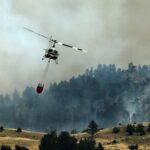Get an insider’s look into what’s happening in and around the halls of power with expert reporting, analysis and insight from the editors and reporters of Montana Free Press. Sign up to get the free Capitolized newsletter delivered to your inbox every Thursday.
July 11, 2024
Move over DNC.
The big end-of-August Democratic event kicking off the final push to the general election might not be the one you’re thinking of.
“Rock on Jon” is a Missoula fundraiser for U.S. Sen Jon Tester on Aug. 21, the day before Pearl Jam’s Aug. 22 concert at the University of Montana’s Washington-Grizzly Stadium, part of the band’s Dark Matter world tour. An Aug. 21 reception with Tester and Pearl Jam bassist Jeff Ament is part of the package for “Big Sky Rocker” and “Super Fan” donors paying $400 or more. The Aug. 22 concert isn’t a fundraising event for Tester.
The Tester event overlaps with the Democratic National Convention in Chicago, which kicks off Aug. 19. Tester won’t be attending the convention.
“Jon Tester plans to spend his August farming and meeting face to face with Montanans,” campaign press secretary Harry Child told Capitolized.
It’s been more than a decade since a top-ballot Montana Democrat participated in the national convention. Tester didn’t make an appearance in 2012, when then-U.S. Rep. Denny Rehberg was challenging him. That 2012 election is the only time other than this year that Tester has shared a ballot with a presidential race.
In 2016, Steve Bullock, then running for re-election as governor, stayed home, telling the press he had to look after the state. Bullock’s opponent at the time was Greg Gianforte, who was elected governor four years later. That was also the year Bernie Sanders defeated Hillary Clinton in the Montana primary for president.
Then-U.S. House candidate Denise Juneau said she was staying home in 2016 to work on her campaign. Juneau had a speaking role at the 2012 convention.
The pandemic wiped out most in-person participation for Joe Biden’s nomination at the 2020 convention.
The Democratic attendance exception was 2008, when both Sen. Max Baucus and Gov. Brian Schweitzer attended the convention in Denver, where Schweitzer had a speaking role. Both men were on track to easily win re-election. It was the same year Barack Obama watched from a supporter’s home in Billings as Hillary Clinton gave her convention speech.
Top-ballot Montana GOP candidates usually attend the Republican National Convention. U.S. Rep. Ryan Zinke had a speaking role in 2016.
—Tom Lutey
Dark Horse Daines
U.S. Sen. Steve Daines became a surprising (to some) addition to a list of potential replacements for retiring Senate Republican Leader Mitch McConnell of Kentucky earlier this year. Daines, now finishing his 10th year in the Senate, is the least experienced senator in the mix.
The discussion about McConnell’s replacement had been focused on the “Three Johns”: Thune, of South Dakota; Barrasso, of Wyoming; and Cornyn, of Texas. Their experience in the chamber ranges from Thune’s 19 years to Cornyn’s 22.
Then, in February, Donald Trump weighed in on social media, endorsing Daines for Republican Leader and, according to the news site Axios, urging Daines behind the scenes to run for the caucus-nominated position even before McConnell announced he wouldn’t run for the position again.
If Daines is interested in the position, he’s not advertising it.
“Sen. Daines is focused on serving the people of Montana and taking back the Senate so that Republicans are electing a majority, not a minority leader, come November,” Rachel Dumke, Daines’ communications director, told Capitolized this week.
Daines is chairman of the National Republican Senatorial Committee, which supports Republican Senate candidates. The position comes with a spot on McConnell’s leadership team, but that role’s term has historically been three years and done.
After Trump visited the Senate on June 13, Daines resurfaced as a potential McConnell successor, this time in The Economist, which offered a look at what a Republican Senate majority might do with its newfound power.
“At the moment the race to succeed Mr. McConnell as the Republicans’ leader in the Senate seems a toss-up between John Thune of South Dakota and John Cornyn of Texas, although if Mr. Trump were to throw his weight behind an alternative, such as Steve Daines of Montana, that could prove decisive,” the magazine reported.
—Tom Lutey
Tester Says Biden Has To Prove It
As more members of Congress raise public concerns about President Joe Biden’s ability to win a second term, Montana U.S. Sen. Jon Tester has sharpened his response on the question.
“President Biden has got to prove to the American people — including me — that he’s up to the job for another four years. Meanwhile, I’ll continue to do what I’ve always done: Stand up to President Biden when he’s wrong and protect our Montana way of life,” Tester said in an email issued to the press July 8.
Shortly after the June 27 Biden-Trump debate, widely considered a debacle for Biden, a Tester spokesperson indicated the senator would work with whoever wins the 2024 presidential election to serve Montana, be it Biden or Trump.
It’s a given that Montana voters won’t break for a Democrat in the 2024 presidential race. Bill Clinton was the party’s last presidential candidate to win Montana, in 1992. That means top-ballot candidates like Tester need split-ticket voters, but those voters are getting harder to come by, said Jeremy Johnson, political science professor at Carroll College.
Breakout performances, like Gov. Steve Bullock doing almost 15 percentage points better than Hillary Clinton to win re-election in 2016, are rare, Johnson said. Bullock won 50.2% of the vote to defeat Republican Greg Gianforte with numbers closer to Donald Trump’s 55.6% than Clinton’s 35.4%.
More typical are margins just a few points better than the presidential candidate. In 2020, Bullock did 5 percentage points better than Joe Biden, capturing 45% of the Montana vote.
In 2012, Tester did 7 percentage points better than Barack Obama to win re-election, but still didn’t clear 50%.
Johnson said he will be looking to see how new arrivals to Montana will vote, and whether being less familiar with the candidates will affect their choices.
—Tom Lutey





